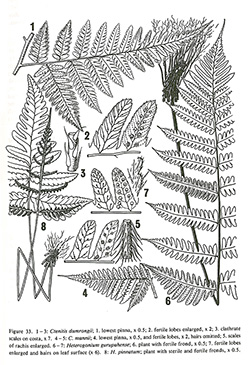e-Flora of Thailand
Volume 3 > Part 3 > Year 1988 > Page 361–362 > Dryopteridaceae > Heterogonium
1. Heterogonium gurupahense (C.Chr.) Holttumwfo-0001267031
Reinwardtia 3: 272. 1955; Rev. Fl. Malaya 2nd ed. 2: 636. 1968; Tagawa & K.Iwats., S.E. Asian Stud. 5: 99. 1967.— Dryopteris sagenioides var. gurupahense C.Chr., Svensk Bot. Tidskr. 16: 95. f. 2. 1922. Fig. 33. 6–7.
Accepted Name : Dryopteris gurupahensis (C.Chr.) C.Chr.
Bot. Jahrb. Syst. 66: 45. 1933.
Synonyms & Citations :
Description : Rhizome short, ascending or suberect; scales oblong, gradually narrowing towards tailed apex, dark brown, stiff, paler and somewhat ferrugineous at margin, hairy, up to 3 by 1 mm. Stipe deep purple, polished, 20–40 cm long, minutely pubescent throughout. Lamina bipinnatifid, oblong-lanceolate, acuminate at apex, up to 40 by 35 cm, lateral pinnae about 10 pairs, sessile, lanceolate, caudate at apex, truncate at base, deeply lobed nearly to costa; basal pinna 7–5 by up to 5 cm; middle pinnae up to 12 by 3.5 cm, upper ones gradually becoming smaller, adnate at base, forming indistinct apical portion; pinnules oblong to oblong-subdeltoid, rounded to acute at apex, entire or crenulate in larger ones, herbaceous, deep green, hairy on both surfaces, costules and veins hairy, veinlets forked; hairs on upper surface of sterile pinna dense, of two kinds, the larger ones about 1.5 mm long, 4–9 celled, more or less articulated, the shorter one slender, 0.2–0.4 mm long, unicellular to 3-celled. Sori dorsal on veinlets, medial, round indusiate; indusia small, fugacious, densely hairy.
Thailand : NORTHERN: Chiang Rai, Chiang Mai (Ban Du), Phitsanulok (Thung Salaeng Luang); CENTRAL: Nakhon Nayok (Khao Yai); SOUTH-EASTERN: Rayong (Khao Chamao), Chanthaburi (Khao Soidao, Kao Sabap), Trat (Bo Rai, Ko Chang); PENINSULAR: Ranong (Ko Banghen), Surat Thani (Ban Don), Phangnga (Khao Katha Khwam, Khao Phra Mi), Phuket (Thalang), Nakhon Si Thammarat (Khao Luang), Trang (Khao Chong), Pattani (Yaring), Narathiwat (Waeng).
Distribution : Burma (Mergui and Tenasserium), Vietnam, W Malaysia, Celebes (type).
Ecology : On mountain slopes in dense evergreen forests at lower to middle altitudes.
Notes: The identification of this species is in the sense of Holttum (1955). Thai material differs from the isotype in BM in having about 10 pairs of lateral pinnae, the upper surface more densely hairy, and the pinnules of the lower pinnae usually about 15 in pairs.
E-version notes : For more details see Ferns of Thailand, Laos and Cambodia, as Heterogonium sagenioides (Mett.) Holttum

